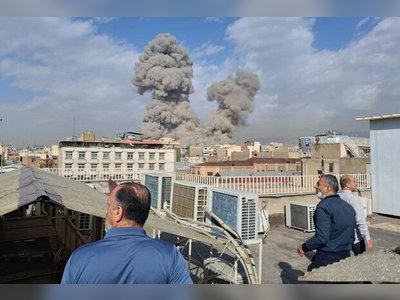
Biden rebuffed as US relations with Saudi Arabia and UAE hit new low
As oil prices – and diplomatic tensions – rise, two of the biggest US allies are questioning the basis of their relationship
As Joe Biden moved to open US strategic oil reserves, his two biggest oil-producing allies have kept their tanks firmly shut. The UAE and Saudi Arabia continue to rebuff the US president as he attempts to counter soaring oil prices prompted by Russia’s invasion of Ukraine. And both countries have been unusually frank about their refusal to step in.
The five-week-old war is bringing tensions to a head in several parts of the world, but perhaps nowhere is a regional order more under strain than the Middle East, where two of America’s biggest allies are now seriously questioning the foundations of their relationship.
The Saudi and Emirati refusal to bail Biden out – or even to take his calls – has pushed relations between the Gulf states and Washington to an unprecedented low. The extraordinary flow of Russian wealth to Dubai, just as the US and Europe try to strangle Putin’s economy, has inflamed things further.
Add to that the still-sputtering talks between Washington and Tehran, which could see sanctions reprieves in return for Iran returning to the Obama-era nuclear deal, and there are clear signs of a faltering friendship – with the potential to rewrite the geopolitics of the region.
Usually opaque and often inscrutable, officials in Abu Dhabi and Riyadh have in recent weeks been uncharacteristically blunt to visiting diplomats about the nature of their grievances, and how far they are prepared to take them. One western diplomat told the Guardian that a Saudi counterpart had said: “This is the end of the road for us and Biden, but maybe the US also.”
Prominent Saudi and Emirati commentators shared the same sentiments. The former al-Arabiya editor-in-chief, Mohammed al-Yahya chose the previously unlikely forum of the Jerusalem Post to publish his views on the standoff.
“The Saudi-US relationship is in the throes of a crisis,” he wrote. “I am increasingly disturbed by the unreality of the American discussion about the subject, which often fails to acknowledge just how deep and serious the rift has grown.
“A more realistic discussion should focus on one word: divorce. When Barack Obama negotiated the nuclear deal with Iran, we Saudis understood him to be seeking the breakup of a 70-year marriage.
“How could we not? After all, the flaws in the deal are well known. It paves a path for Iran to a nuclear bomb. It fills the war chest of Iran’s Islamic Revolutionary Guard Corps, which has spread militias across the Arab world armed with precision-guided munitions to maim and kill people who formerly looked to America to help guarantee their safety.
“Why should America’s regional allies help Washington contain Russia in Europe when Washington is strengthening Russia and Iran in the Middle East?”
Al-Yahya contrasted Washington’s demands with Beijing’s no-strings diplomacy, saying: “While American policy is beset by baffling contradictions, Chinese policy is simple and straightforward. Beijing is offering Riyadh a simple deal: sell us your oil and choose whatever military equipment you want from our catalogue; in return, help us to stabilise global energy markets.
“In other words, the Chinese are offering what increasingly appears modelled on the American-Saudi deal that stabilised the Middle East for 70 years.”
In recent months, Brett McGurk, the White House coordinator for the Middle East, has been a frequent visitor to Riyadh, trying to calibrate a relationship that soured soon after Biden’s inauguration, when he refused to speak to Saudi Arabia’s de facto leader, Mohammed bin Salman.
That stance set the tone for the standoff that has followed. And both Prince Mohammed and his counterpart in the UAE, Mohamed bin Zayed, remain deeply wary of the administration’s determination to push through the nuclear deal, which would give Iran comprehensive sanctions relief in return for abandoning the capacity to build a nuclear weapon.
A perceived lack of support from Washington for the Saudi-led campaign against Houthis in Yemen has added to the angst. And so too has an approach of an administration that Riyadh and Abu Dhabi believe is willing to sacrifice allies for idealism. The naked transactional diplomacy of Donald Trump was a formula more familiar to both, and had been readily deployed by China, to whom each is looking towards for closer trade, energy and even security ties.
Professor Abdulkhaleq Abdulla, a noted scholar in political science, described the crisis with Washington as the worst in “50 years”.
He laid a litany of gripes at the doors of the White House, which he said had built up particularly during the Biden administration.
Writing in the Lebanese daily Annahar, he said: “The UAE’s relationship with the US partner is at stake, at a crossroads. It is certain that the task of fixing the misunderstanding falls on the shoulders of the Biden administration, which may be on the verge of losing a regional partner that is increasingly self-confident and has an increasing regional and global presence.
“The UAE has invested a lot in its relations with Washington. We allocated the bulk of our investments of huge sovereign wealth funds in the American markets, excluding Asian and European markets, and had wanted to increase trade with Washington.”
Abdulla said the UAE felt snubbed by Washington not signing a deal to supply new F-35 fighter jets.It was also angered by Biden’s distance following a deadly Houthi drone and rocket strike on Abu Dhabi.
“What made matters worse was the Biden administration’s objection to sovereign Emirati decisions, such as receiving Bashar al-Assad … and putting pressure on Abu Dhabi to increase its oil production outside the context of the Opec agreement.
“All this comes at a time when America is no longer the only superpower in the world, which prompted the UAE and other countries to diversify partners.”
The five-week-old war is bringing tensions to a head in several parts of the world, but perhaps nowhere is a regional order more under strain than the Middle East, where two of America’s biggest allies are now seriously questioning the foundations of their relationship.
The Saudi and Emirati refusal to bail Biden out – or even to take his calls – has pushed relations between the Gulf states and Washington to an unprecedented low. The extraordinary flow of Russian wealth to Dubai, just as the US and Europe try to strangle Putin’s economy, has inflamed things further.
Add to that the still-sputtering talks between Washington and Tehran, which could see sanctions reprieves in return for Iran returning to the Obama-era nuclear deal, and there are clear signs of a faltering friendship – with the potential to rewrite the geopolitics of the region.
Usually opaque and often inscrutable, officials in Abu Dhabi and Riyadh have in recent weeks been uncharacteristically blunt to visiting diplomats about the nature of their grievances, and how far they are prepared to take them. One western diplomat told the Guardian that a Saudi counterpart had said: “This is the end of the road for us and Biden, but maybe the US also.”
Prominent Saudi and Emirati commentators shared the same sentiments. The former al-Arabiya editor-in-chief, Mohammed al-Yahya chose the previously unlikely forum of the Jerusalem Post to publish his views on the standoff.
“The Saudi-US relationship is in the throes of a crisis,” he wrote. “I am increasingly disturbed by the unreality of the American discussion about the subject, which often fails to acknowledge just how deep and serious the rift has grown.
“A more realistic discussion should focus on one word: divorce. When Barack Obama negotiated the nuclear deal with Iran, we Saudis understood him to be seeking the breakup of a 70-year marriage.
“How could we not? After all, the flaws in the deal are well known. It paves a path for Iran to a nuclear bomb. It fills the war chest of Iran’s Islamic Revolutionary Guard Corps, which has spread militias across the Arab world armed with precision-guided munitions to maim and kill people who formerly looked to America to help guarantee their safety.
“Why should America’s regional allies help Washington contain Russia in Europe when Washington is strengthening Russia and Iran in the Middle East?”
Al-Yahya contrasted Washington’s demands with Beijing’s no-strings diplomacy, saying: “While American policy is beset by baffling contradictions, Chinese policy is simple and straightforward. Beijing is offering Riyadh a simple deal: sell us your oil and choose whatever military equipment you want from our catalogue; in return, help us to stabilise global energy markets.
“In other words, the Chinese are offering what increasingly appears modelled on the American-Saudi deal that stabilised the Middle East for 70 years.”
In recent months, Brett McGurk, the White House coordinator for the Middle East, has been a frequent visitor to Riyadh, trying to calibrate a relationship that soured soon after Biden’s inauguration, when he refused to speak to Saudi Arabia’s de facto leader, Mohammed bin Salman.
That stance set the tone for the standoff that has followed. And both Prince Mohammed and his counterpart in the UAE, Mohamed bin Zayed, remain deeply wary of the administration’s determination to push through the nuclear deal, which would give Iran comprehensive sanctions relief in return for abandoning the capacity to build a nuclear weapon.
A perceived lack of support from Washington for the Saudi-led campaign against Houthis in Yemen has added to the angst. And so too has an approach of an administration that Riyadh and Abu Dhabi believe is willing to sacrifice allies for idealism. The naked transactional diplomacy of Donald Trump was a formula more familiar to both, and had been readily deployed by China, to whom each is looking towards for closer trade, energy and even security ties.
Professor Abdulkhaleq Abdulla, a noted scholar in political science, described the crisis with Washington as the worst in “50 years”.
He laid a litany of gripes at the doors of the White House, which he said had built up particularly during the Biden administration.
Writing in the Lebanese daily Annahar, he said: “The UAE’s relationship with the US partner is at stake, at a crossroads. It is certain that the task of fixing the misunderstanding falls on the shoulders of the Biden administration, which may be on the verge of losing a regional partner that is increasingly self-confident and has an increasing regional and global presence.
“The UAE has invested a lot in its relations with Washington. We allocated the bulk of our investments of huge sovereign wealth funds in the American markets, excluding Asian and European markets, and had wanted to increase trade with Washington.”
Abdulla said the UAE felt snubbed by Washington not signing a deal to supply new F-35 fighter jets.It was also angered by Biden’s distance following a deadly Houthi drone and rocket strike on Abu Dhabi.
“What made matters worse was the Biden administration’s objection to sovereign Emirati decisions, such as receiving Bashar al-Assad … and putting pressure on Abu Dhabi to increase its oil production outside the context of the Opec agreement.
“All this comes at a time when America is no longer the only superpower in the world, which prompted the UAE and other countries to diversify partners.”
Comments

Oh ya 4 year ago
Can you say end of petro dollar thus end of world reserve currency. America is in for a world of hurt like they have never seen before. Lose RWC status and that ends printing money at will. Having to live within a country budget is something Americans have not done in many many years. Buckle up.










